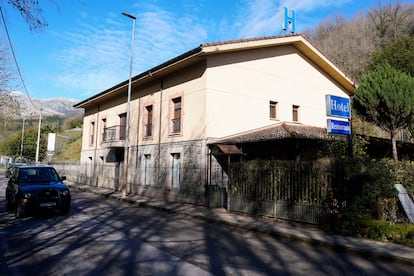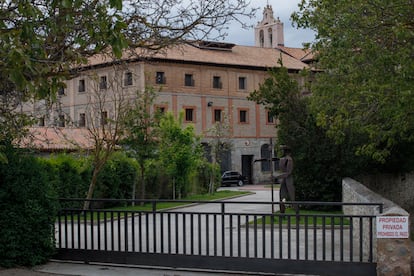Excommunicated nuns will open Spain’s first ‘cloistered’ restaurant
The Catholic sisters are trying to raise funds after they were told to vacate their convent. Prior to that they had joined a schismatic group led by a ‘bishop’ who is not recognized by Rome

A group of Roman Catholic nuns who were excommunicated last May are planning to open Spain’s first “cloistered” restaurant in the town of Arriondas, in the small and mountainous northern region of Asturias. The nuns, who hail from the Monastery of Santa Clara de Belorado in Burgos, have rented a hotel-restaurant called La Ribera del Chicu for €1,600 ($1,670) a month, where they want to serve up traditional dishes based on recipes from their religious order, the Poor Clares. The hotel will be used as a residence.
The entrepreneurial sisters came up with this plan as part of a temporary solution to their financial problems while the courts deal with an eviction suit against them filed by their religious superiors, the bishops of Burgos. Predating this legal battle between the rebel nuns and the bishops is another dispute over an aborted real estate operation involving more than €1 million ($1.04 million). And in between, there is the sisters’ decision to put themselves under the jurisdiction of a ‘bishop’ who is not recognized by Rome.
Three former nuns from Belorado will move to Arriondas, where they will be in charge of the restaurant’s kitchen and work on a menu based on traditional Asturian dishes and recipes from the Poor Clares, including the pastries, truffles and other sweets that they used to prepare in Belorado for sale to the public. Their idea is that volunteers or hired staff will serve the tables, thus allowing them to remain cloistered and not have to interact directly with the diners.

In this new project, the ex-nuns will devote themselves to cooking, but they have also bought a 7,000 square-meter plot of land near the restaurant that has a license to operate as a zoological center. Their intention is to develop various projects involving the breeding and training of companion dogs for abused women and guide dogs for disadvantaged groups.
The former Poor Clares underscore that they are “entrepreneurial nuns, charismatic and initiative-driven women known for being innovative and who have never ceased in their creative and entrepreneurial spirit.” They have acknowledged that they have urgent bills to pay and that their resources are currently very limited.
Real estate deals
The members of this community were excommunicated in May. The origin of the dispute seems to lie in their claim that the Archdiocese of Burgos had hindered their attempt to acquire a monastery in Orduña with proceeds from the sale of another religious property. After criticizing the move, the nuns spoke of persecution, renounced Pope Francis, and joined the Pious Union of Saint Paul the Apostle, which Rome as well as religious experts consider to be a sect. This movement is headed by Pablo de Rojas Sánchez-Franco, who was himself excommunicated in 2019.

The nuns also have an unusual figure in the world of cloistered communities: a press officer, Francisco Canals. “They have been the target of all kinds of media campaigns, denigration campaigns, hoaxes, rumors. They have explored different places in Spain and found a place on the outskirts of Arriondas in Asturias,” says Canals, adding that “their bank accounts have been seized,” that they are dealing with “numerous legal cases” and that “they [their superiors] want to evict them from the convent where their own community has lived for almost 700 years.”
“They have been boycotted from participating in culinary or gastronomic events to talk about their sweets, and they have even been denied the renewal of the sanitary license to make their famous chocolates,” he adds. “The result is that they can do practically nothing, they are being repressed from all sides instead of getting support for their creative spirit.”
The problems began in earnest in May of last year when the Archbishop of Burgos, Mario Iceta, told the 10 rebel nuns of Belorado to vacate the premises and announced “legal action” if they refused to leave “within a reasonable period of time.” At that point, the sisters had been recently excommunicated by the Holy See for refusing to recognize the leadership of the pope in Rome. As a result, said Iceta, they cannot continue living in official Church properties. Iceta asked the nuns to return “home, like the parable of the prodigal son” but these, under the orders of the excommunicated bishop Pablo de Rojas, stayed put and denied having to obey the orders of the Archbishop, since they had already “separated from the conciliar Church.”
By then, the nuns had already accused the Archbishopric of Burgos of impeding a plan to acquire the abandoned nearby monastery of Orduña for €1.2 million ($1.25 million). The nuns have been in judicial confrontation with the Archdiocese and are now claiming €1.6 million ($1.67 million) as compensation.
Police investigation

Meanwhile, the Spanish police are investigating the former abbess of the monastery, Laura García de Viedma (previously known as Sister Isabel de la Trinidad) over the sale of various gold objects for which she is believed to have obtained around €130,000 (over $134,000). The sold items have been seized until their origin is cleared up. Officers are investigating whether the ingots and coins come from the scrapping of religious objects, or whether they come from known and legitimate investments by the former nuns. The latter’s lawyer has denied any wrongdoing, while the Archbishopric of Burgos has accused the former abbess of not having the legitimacy to carry out economic transactions.
The rebel nuns have continued to express themselves through their website and their Instagram account (@tehagoluz), where they have included their bank account number in case anyone wants to make financial contributions. The 10 sisters have justified their refusal to appear before an ecclesiastical court claiming that, having broken “freely, voluntarily and decisively from the conciliar Church, as a result of mature, meditated and conscious reflection,” those laws cannot be applied to them.
Sign up for our weekly newsletter to get more English-language news coverage from EL PAÍS USA Edition
Tu suscripción se está usando en otro dispositivo
¿Quieres añadir otro usuario a tu suscripción?
Si continúas leyendo en este dispositivo, no se podrá leer en el otro.
FlechaTu suscripción se está usando en otro dispositivo y solo puedes acceder a EL PAÍS desde un dispositivo a la vez.
Si quieres compartir tu cuenta, cambia tu suscripción a la modalidad Premium, así podrás añadir otro usuario. Cada uno accederá con su propia cuenta de email, lo que os permitirá personalizar vuestra experiencia en EL PAÍS.
¿Tienes una suscripción de empresa? Accede aquí para contratar más cuentas.
En el caso de no saber quién está usando tu cuenta, te recomendamos cambiar tu contraseña aquí.
Si decides continuar compartiendo tu cuenta, este mensaje se mostrará en tu dispositivo y en el de la otra persona que está usando tu cuenta de forma indefinida, afectando a tu experiencia de lectura. Puedes consultar aquí los términos y condiciones de la suscripción digital.








































